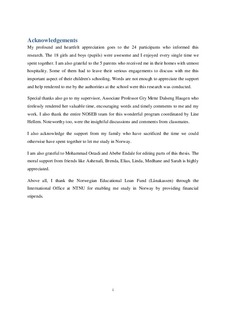Exploring Children's Lived School Experiences in Zambia: Negotiating School Social Spaces
Master thesis
Permanent lenke
http://hdl.handle.net/11250/269106Utgivelsesdato
2013Metadata
Vis full innførselSamlinger
Sammendrag
Just like other parts of the world, schools in Zambia are, by and large, expected to be spaces for children to socialize and acquire knowledge and skills. However, the school practices in most parts of the world suggest that school spaces are 'ideal spaces for children's training' and 'preparation for the future'. They are seen as places that keep children away from danger and misdemeanor.
In view of the foregoing, the aim of this thesis was to explores children's lived school experiences and understand how they negotiate through school social spaces. The study examines school practices, physical spaces and gender differences therein. At the core of this research were views and perceptions of children, parents and teachers on schooling as a lived space. The study further discusses issues related to social structural approaches (generation and agency), space and non-spaces for children and childhood, and gender perspectives.
To that end, empirical data was collected using interviews, focus group discussions and observations in school spaces and some homes. The recorded data from all 24 participants (18 children aged between 15 and 17, 5 parents and 1 teacher) were transcribed and coded into emerging themes. These were then thematically analysed by category in relation to practice and theory.
Findings in this research suggest that childhood is viewed as a period of schooling and training by both adults and children. In general, adults argued that children are incompetent, immature, and irresponsible and lack the ability to coordinate their own activities. This characterization of childhood is typical of Zambian society and the analysis finds that in this respect, children's agency is underestimated by the parents and teachers working with children in the studied schools.
The research has highlighted strategies that children use to negotiate through school physical spaces in view of the many rules and regulations set by adults. It also suggests that school spaces can actually be non-spaces of children and childhood as the latter continue to occupy the worst parts of these social spaces.
Results also suggest differences between girls and boys in the way they view schooling and childhood. Girls saw school spaces as a place for less rules and obligations and the home as a space for domestic work. Boys however, to a larger extent, saw the home as a space for play due to less domestic obligations and rules while school as an adult space due rules and regulations. The difference in perception of the two spaces can be attributed to social cultural constructions about 'boyhood' and 'girlhood' that are embedded in Zambian society. Everything about children and childhood is seen through adult eyes and not based on views and perceptions of children themselves.
